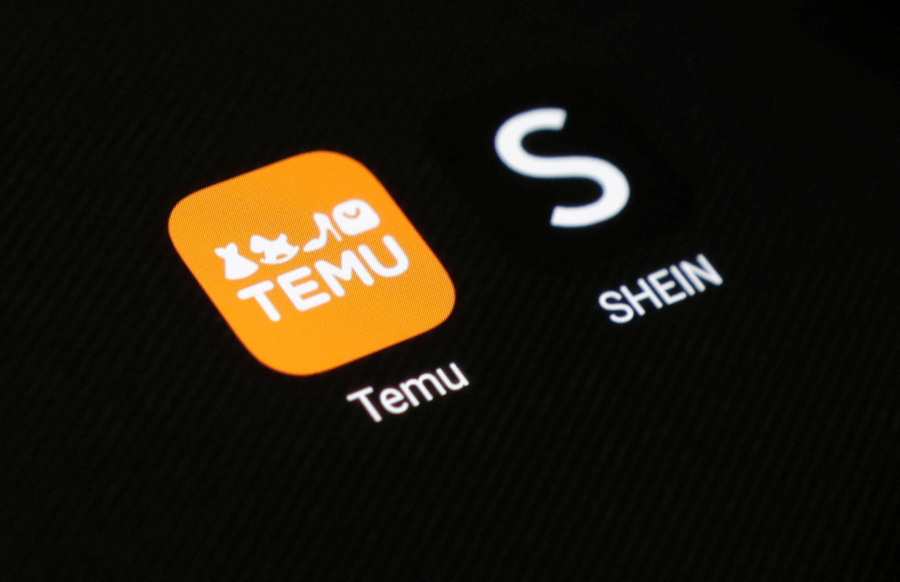Shein and Temu app icons are seen in this illustration taken August 22, 2024. (REUTERS/Dado Ruvic/Illustration/File Photo)
(Reuters) -The Biden administration said on Friday it was moving to curb low-value shipments entering the U.S. duty-free under the $800 "de minimis" threshold that has been exploited by Chinese e-commerce firms such as Shein and PDD Holdings' Temu.
White House officials said they will propose the new trade rules to deny the duty-free exemption to packages that contain low-value goods subject to the Section 301 tariffs on Chinese goods, the Section 232 tariffs on steel and aluminum products and Section 201 on "safeguard" tariffs on products including solar products and washing machines.
The proposed rule includes new information disclosure requirements for small packages to help U.S. Customs and Border Protection agents to better identify contents for illicit or unsafe products such as precursor chemicals that can be made into the deadly opioid fentanyl.
"American workers and businesses can outcompete anyone on a level playing field, but for too long Chinese e-commerce platforms have skirted tariffs by abusing the de minimis exemption," said U.S. Secretary of Commerce GinaRaimondo.
The White House announcement comes two days after Democratic lawmakers in Congress urged President Joe Biden to use executive powers to close the de minimis provision, which they called a "loophole" that has allowed Chinese imports to evade tariffs and ship narcotics to the U.S. without customs inspection.
The exemption has been part of U.S. trade law since 1930 to accommodate individual travelers, but the threshold was increased to $800 from $200 in 2015 as an aid to small businesses, including sellers on e-commerce platforms such as eBay.
Packages under the limit enter duty-free and with less customs scrutiny as long as they are addressed to individuals' residences.
Since then, the volume of packages entering the U.S. under the $800 threshold has exploded to over 1 billion last year from around 140 million a decade ago, White House officials said, attributing most of the growth to Chinese e-commerce firms.
Among the biggest beneficiaries have been Shein and Temu, which ship direct to U.S. consumers from China. The news sent shares of Temu-owner PDD Holdings down more than 5% before the bell.
Temu and Shein did not respond to Reuters requests for comment.
U.S. textile manufacturers blame the exemption for allowing low-value clothing packages to skirt U.S. Section 301 tariffs, which cover some 70% of large-scale Chinese textile and apparel imports.
"The drastic increase in de minimis shipments has made it increasingly difficult to target and block illegal or unsafe shipments coming into the US through this pathway," White House Deputy National Security Adviser Daleep Singh said.
"That's why the administration is starting a regulatory process to curtail de minimis overuse and abuse."
The goal of the new rules is to reduce the volume of de minimis shipments to a more manageable level to better screen packages, a senior administration official said.
Another proposed rule would require de minimis packages to contain product tariff codes and other information to help better identify suspect shipments.
It was unclear how quickly the proposed rules could be implemented. They would require public comment periods to allow interested parties to weigh in before they are finalized.
Administration officials said they are working with lawmakers to pass reforms to the trade provision for blanket exclusions of certain import-sensitive products.
The action was announced on the same day that the Biden administration locked in steep U.S. tariff increases on some $18 billion worth of Chinese imports, including 100% duties on electric vehicles, 50% on semiconductors and solar cells and 25% on lithium-ion batteries, steel and aluminum.
(Additional reporting by Stephen Eisenhammer in Mexico City and Savyata Mishra in Bengaluru; Reporting by David Lawder; Editing by Miral Fahmy)











News magazine bootstrap themes!
I like this themes, fast loading and look profesional
Thank you Carlos!
You're welcome!
Please support me with give positive rating!
Yes Sure!